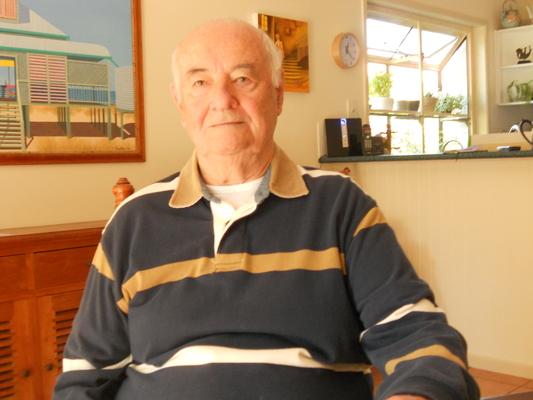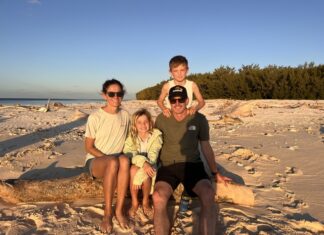By Tony Page
Tony Page of Tewantin was a boy living in the UK when WWII broke out. He shared stories with Noosa Today as We Remember stories of war time in the lead up to the 100th anniversary of the end of WWI on 11 November.
I was born in the UK in August 1932, so I was old enough to remember the war from its very outset.
My sister Jean, was ten years older than I and was studying German at Bonn University. in July 1939 my father was worried about a pending war and insisted that Jean return to England. On 26 July mother and I went to Victoria Station to meet Jean off the boat train. While we were waiting on the main concourse an IRA bomb went off in the left luggage office. A number of people were injured but I don’t think anyone was killed. We had been standing near the huge suspended main clock which was stopped by the blast.
My first memory of the actual war was on Monday 4 September 1939. My mother and I had visited my father in his city office. Afterwards we walked from the city down the Strand into Whitehall and then opposite Big Ben my mother bought a newspaper with one word on the front page “WAR”.
Shortly afterwards my mother sent me out of London to Westcott in Surrey where I stayed with her friends the Thomas’s. Saturdays were a special treat when local ladies would take small groups of us out on nature rambles.
In May 1940, after Dunkirk, trains full of troops rescued from France came through, usually very slowly, and many villagers lined the tracks to give the troops hanging out of the windows whatever they could in the way of food.
Things were so quiet my mother decided to take me back to London, just in time for the start of the London Blitz, which ran from 20 June 1940 to 31 March 1941.
We were living in the top floor of a three-story mansion that had been converted into flats. Each night about 6pm as the sirens wailed, we went down to our little basement coal cellar under the stairs. Light was from tiny oil lamps. Despite the almost continuous noise of the bombardment we managed to sleep on two deck chairs until the ‘All Clear’ siren sounded in the morning. To pass the time I learnt to knit woolen ropes with the aid of a cotton reel and then graduated to small squares to be made into quilts.
One night a bomb fell just across the road and set a major gas main on fire. It was so spectacular I was allowed up to see it. My mother had been cleaning her much prized silver tea service and left it on the kitchen table. Unfortunately, the kitchen ceiling was one of those that fell down, squashing the silver tea service flat.
The Liverpool Blitz went from 28 August to 22 December 1940. Fairly early during that time my sister Jean was working with the Ministry of Food which had been evacuated to Colwyn Bay in North Wales. Jean persuaded mum to take a holiday there away from the Blitz. Mum, Jean and I went one evening to see a live show in the pier theatre. When it ended everyone walked out to the end of the pier. To the North across the bay some 35 km away Liverpool was being heavily raided. There was a huge red glow over the city, punctuated with bright flashes. We could clearly see reflections from the attacking aircraft illuminated by the glow from the fires below and searchlights. I think all the ladies present (probably not only the ladies) were crying. Otherwise it was silent. Just a faint rumble like a distant thunderstorm could be heard. Slowly people just turned away and went home. It was the saddest thing I have ever seen.
Shortly after this my sister left the Ministry of Food and joined the WAAF. We returned to London but the nightly bombing decided my mother to move to North Wales. She got a job at a quite prestigious boarding school, which also ran a very small day school of about a dozen pupils and my admission was included in her salary. After some two years there it was decided we should return to London so that I could take the Ten Plus exam that served as entrance to the better schools. I gained acceptance to Westminster City school which was evacuated to the Judd School in Tonbridge.
We were billeted out to local families. Air raids continued. Kent seemed to be on bomber routes in and out of London. After one particularly noisy night we found a Junkers 88 had crashed less than half a mile behind the house.
After a school holiday in London I was so unhappy with my billet I refused to return to Hildenborough. My mother and I visited the school office in Westminster and I got a transfer to a school in Chelsea and took the 137 Bus.
Then in June 1944 the V1’s or so-called Doodlebugs or Buzz Bombs started. Over an amazing 8,000 exploded in the Greater London area killing some 23,000 people. They were really frightening; being driven by a large Pulsejet engine which was incredibly noisy. At first the air raid sirens would sound but then they gave up as the Doodlebugs were coming continuously. People just got used to getting on with their business. Initially the Buzz Bombs flew until they simply ran out of fuel causing them to crash and explode. There were these awful moments of quiet after the engine stopped waiting for the explosion. Even worse, if you could hear the rush of air from the falling Bug, then you knew it was going to be close!
One morning as we were crossing on the Chelsea Bridge a Doodlebug passed in front of the 137 bus, no more than a few feet higher, travelling along the river. I was sitting at the upstairs front of the bus.
Another time my mother and I were walking to the shops at Clapham when a Bug exploded nearby. A column of smoke and debris went up only a street away. Small items of debris fell around us, and then a large family photograph landed on the pavement in front of us. We paused and looked at it wondering out of those in the picture who had survived.
A Doodlebug fell quite close by to our home and it proved too much for the building, causing a crack for the full three stories in the main internal wall. You could see through it and in places would have been able to put your arm through. My mother decided it was time to move. We moved to Clacton-on-Sea.
The V2 rockets commenced soon after the Buzz Bombs, on 8 September 1944. In small numbers at first then launching a total of some 1,400 till 27 March 1945 killing some 2,800 people. From Clacton we often saw their contrails streaking across the sky. At least with the V2’s there was no terrifying noise as they were supersonic, the first thing was the explosion and then you heard them coming! Two V2’s hit Clacton both on the seafront promenade. One of them hit when mum and I were in a hardware store with shelving that went up to the ceiling, I thought the shelves were all going to fall on top of us but they settled back and we were safe.
The last, and one of the most significant events that I remember was ‘D’ day. Late in the evening before, aircraft started passing over us headed out to sea. We went outside and watched their silhouette’s as they were flying very low and the procession seemed to go on for hours. We were thrilled to get the papers in the morning announcing the invasion.
VE day when it finally came was celebrated with street parties and bonfires everywhere. But what I remember most clearly after that was the day after the Hiroshima bomb and reading the unbelievable details of the atom bomb and all the things that it was speculated that atomic power could do for the world in the future. None of the public foresaw the Cold War at that time.








